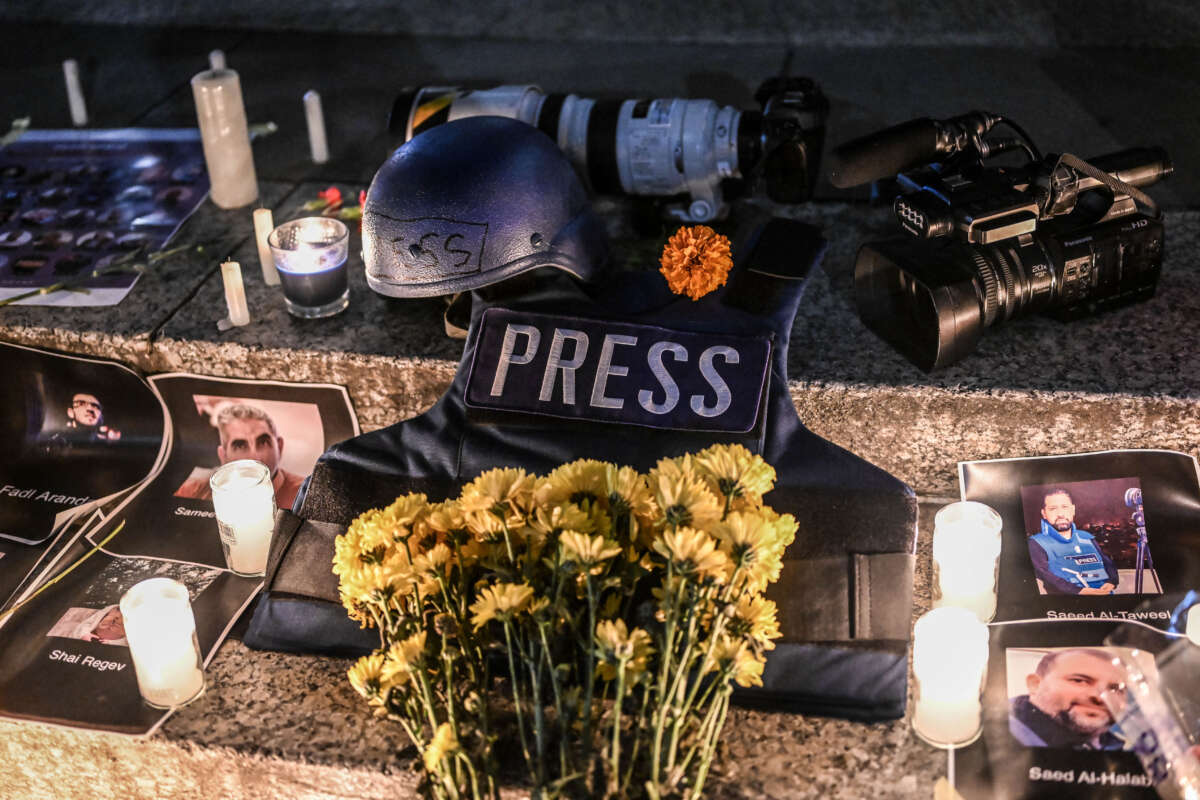A press freedom group said Monday that at least 50 journalists — most of them Palestinian — have been killed since the Hamas-led October 7 attack on Israel, to which the Israeli military responded with an indiscriminate bombing campaign in the densely populated Gaza Strip.
According to the Committee to Protect Journalists (CPJ), which began documenting media worker fatalities in 1992, 45 of the journalists killed thus far were Palestinian, four were Israeli, and one was Lebanese.
An investigation by Reporters Without Borders found that the Lebanese journalist — Issam Abdallah of Reuters — was intentionally targeted in southern Lebanon by strikes launched from the direction of the Israeli border. He and other journalists in the area at the time of the strikes were clearly identifiable as members of the media, wearing helmets and press vests.
CPJ said the first month of Israel’s assault on Gaza was the deadliest on record for journalists, and the toll has continued to grow in recent days. Over the weekend, at least six more Palestinian journalists were killed in Gaza — including Bilal Jadallah, a previous CPJ contributor.
The Palestinian Journalists’ Syndicate said Israeli forces “targeted” Jadallah’s car.
“Bilal Jadallah helped CPJ document a deadly pattern of journalist killings by Israel Defense Forces and it appears that he fell victim to the same pattern on Sunday,” Sherif Mansour, coordinator of CPJ’s Middle East and North Africa program, said in a statement. “His killing leaves a gaping hole in the media landscape in Gaza, where journalists are in severe peril as they cover the war that has claimed the lives of dozens of their colleagues.”
Grim Milestone ⚡As of Nov. 20, in the #IsraelGazaWar, CPJ has documented:
— Committee to Protect Journalists (@pressfreedom) November 21, 2023
– 50 journalists dead: 45 Palestinian, 4 Israeli, 1 Lebanese
– 11 injured
– 3 missing
– 18 arrested
– Multiple Assaults, threats, cyberattacks, censorship, family members killed.https://t.co/W1t8GQMBf8
In addition to sounding alarm over the rising death toll, CPJ has expressed growing concerns about arrests of reporters, threats, censorship, attacks on media offices, and communications blackouts that have left journalists unable to safely do their jobs.
CPJ has documented several assaults on journalists, including by Israeli settlers in the West Bank. Earlier this month, top Israeli officials — including Prime Minister Benjamin Netanyahu—amplified an Israeli media watchdog’s false suggestion that Palestinian journalists were somehow complicit in the October 7 attack, an allegation that further heightened the dangers of reporting on the conflict.
“Journalists in Gaza are facing exponential risk,” Mansour said Monday. “But their colleagues in the West Bank and Israel are also facing unprecedented threats, assaults, and intimidation to obstruct their vital work covering this conflict.”
Israeli forces have repeatedly been accused of deliberately targeting reporters — a war crime under international law—but have yet to face accountability.
“Last May, we said the [Israel Defense Forces] must change their rules of engagement to stop unleashing the use of lethal forces against journalists and media organizations,” Mansour told The Guardian on Tuesday. “We have not seen any indication that this has been done. This time, therefore, we have also called on Israel’s allies, including the United States, Britain, and other European countries to pressure it to stop any use of lethal force against journalists.”
